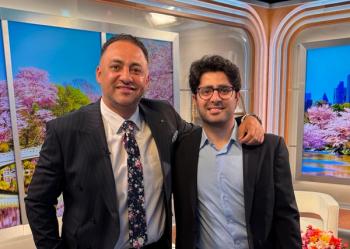
- Vol 34 No 1
- Volume 34
- Issue 1
A Coin Flip
But what if the patient was lying? It's hard to go to sleep at night and not wonder, “. . . what if I'm wrong?”
Resident’s Corner
[[{"type":"media","view_mode":"media_crop","fid":"55829","attributes":{"alt":"© Boule/shutterstock.com","class":"media-image media-image-right","id":"media_crop_7912208402317","media_crop_h":"0","media_crop_image_style":"-1","media_crop_instance":"7000","media_crop_rotate":"0","media_crop_scale_h":"224","media_crop_scale_w":"175","media_crop_w":"0","media_crop_x":"0","media_crop_y":"0","style":"font-size: 13.008px; float: right;","title":"© Boule/shutterstock.com","typeof":"foaf:Image"}}]]Medicine is a field of the unknown. This is especially true of psychiatry and often intriguing to new physicians or researchers: the possibility of discovery.
As residents, we are taught to choose antidepressants for patients based on 1 or 2 key studies, and more often than not, we simply choose based on adverse effects. We sit with therapy patients as we concurrently learn therapy, trying techniques or occasional interpretations, knowing full well that if we are wrong, a patient will tell us, and we can repair ruptures in the therapeutic relationship.
Most of the time, if we flip a coin to make a decision and we make a wrong or ineffective choice, we can just try heads instead of tails the next time. What is the worst that can happen? Except, of course, when it comes to our most frequent coin flip-whether the patient poses a danger to himself or to others.
He was a well-dressed young man in his early 20s. He was relaxed calmly on the gurney in the emergency department awaiting my arrival. His wife sat next to him, holding his hand. He had no psychiatric history, no hospitalizations, and no suicide attempts. He denied all psychiatric symptoms, except occasionally feeling depressed and having some trouble sleeping. He had never been violent, and despite my asking multiple times in different ways, he had no plans, thoughts, or intent to harm anyone. He did not own or have access to a gun. In fact, he had never used one.
As I looked at the young man in front of me, the words of the ED physician echoed in my head: “He said to the nurse at his primary care doctor’s office that he was having thoughts of shooting other people. They documented it in an outpatient note, and then they told him to come and get psychiatrically evaluated. I think they wanted him to be put on a legal hold.”
Maybe the patient is lying to me, I thought. He doesn’t look homicidal, but what does that even look like? Maybe I should decide based on their worries. I mean, they were concerned enough to send him to the hospital.
I then decided to ask him directly about the call to his primary care doctor. He said that he maybe had a thought or two about shooting other people, and was worried, so he called his doctor. He said he wasn’t thinking that way anymore. He reiterated that he was never serious about the thoughts and did not have access to a weapon. He said emphatically, “I would never try to kill anyone, Doc; it sounds crazy just saying it. That’s why I told the doctors in the first place, and that is why I came here.”
He is help seeking, that is a good sign, I again thought to myself. I should trust my patients, but lying could be a symptom. I am a psychiatrist after all.
I spoke to his wife alone. She calmly and assuredly told me the same story. She said they came in because they were told to, not because she was concerned he was going to kill anyone, or hurt her. He was gentle and kind, she said. He would never hurt anyone else. She was happy and willing to take him home with her.
Treat the person, not the chart, I said out loud to my computer as I re-read the medicine note. I sat down to think about the case before calling my attending for approval, and the phrase “imminent risk” repeated like a broken record in my head. He was not one. Even if he had thoughts of hurting others previously, he no longer had those thoughts now. Legally, he did not meet the criteria for a psychiatric involuntary hold and could not be kept at the hospital against his will. My attending agreed with me. This time I would go with heads, and he could leave the hospital tonight.
I turned to relay the news to the ED physician knowing it was not what he had expected. His face changed as he replied, “You are the psychiatrist. This is your territory, so we will do what you say, but you know his chart says he wants to shoot people . . . right? And . . . you do watch the news . . .?”
I could hear the sarcasm in his voice defending against his actual emotion: fear. Fear of the patient and gun violence. Fear that he was lying, or that his wife simply did not know his plans. But, most of all, fear of being wrong and other people getting hurt. Or really, fear of my being wrong, and him agreeing, and then other people getting hurt. I could only imagine the headlines flashing across his mind: “Was the shooter mentally ill?” “Did psychiatry miss something?” or worse, “Could this have been prevented?”
All of his thoughts were ones I had had myself. Maybe it would help if he knew I was from outside Orlando, or that at my Connecticut medical school my pediatrics residents waited in the ED for injured children who never came. Or, maybe I could get on my soapbox and tell him all the ways the news incorrectly links gun violence to psychiatry. I could say that hatred exists outside of the mentally ill, and that mentally ill patients are more likely to be the victims than the perpetrators. I could emphasize that they are more likely to kill themselves than others. But none of that settled the uncertainty of the now.
I didn’t know how to tell him that I had no real way to predict violence in others. I was taught to ask about risk factors and past history, but really, we are pretty bad estimators. I didn’t have a crystal ball or a diagnostic test; I just had a few studies and 2 years of experience. My hands were also tied by the law, as the phrase “imminent risk” echoed in my mind again. There was no way to say to him that the law hasn’t found a way to treat that gut feeling, or to help with the “what ifs.” I was powerless to prevent future possibilities, and perhaps I was just more used to sitting with the heaviness of that uncertainty.
This was my best estimate. A simple coin flip. I could not know for sure.
But, undoubtedly, it is hard to go to sleep at night and not wonder, “. . . but what if I am wrong?”
Disclosures:
Dr. Gold is a PGY-3 Resident, Department of Psychiatry, Stanford University, CA. She reports no conflicts of interest concerning the subject matter of this article.
Articles in this issue
about 9 years ago
Introduction: Cognition, Rarely Discussedabout 9 years ago
Lithium Therapy, Bipolar Disorder- and Neurocognitionabout 9 years ago
To Google or Not to Google? Is “Patient-Targeted” Googling Ethical?about 9 years ago
Opioid Analgesics: The Myths-and the Factsabout 9 years ago
Eight Enemies of Good Writing for the Lay Readerabout 9 years ago
Committed: The Battle Over Involuntary Psychiatric Careabout 9 years ago
An Update on Melancholiaabout 9 years ago
Take Two Pills and ...Newsletter
Receive trusted psychiatric news, expert analysis, and clinical insights — subscribe today to support your practice and your patients.







